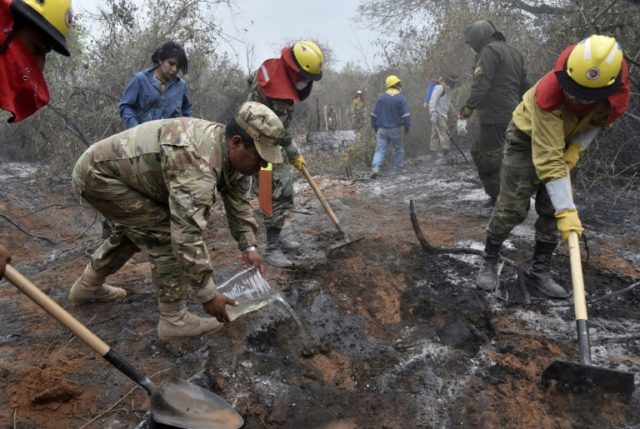La Paz (AFP) – Like his far-right rival President Jair Bolsonaro in neighboring Brazil, Bolivia’s leftist leader Evo Morales is facing mounting fury from environmental groups over voracious wildfires in his own country.
While the Amazon blazes in Brazil have attracted worldwide attention, the blazes in Bolivia’s forest and grassland have raged largely unchecked over the past month, devastating more than 9,500 square kilometers (3,600 square miles).
Morales, under fire for policies his critics say favor greater deforestation, suspended his re-election campaign Sunday to direct the government’s response to the disaster, which now threatens the world’s largest wetlands.
Morales said he would halt campaigning for the October 20 election “for at least one week, to look after all of the Chiquitania,” a region of tropical grasslands, and “all the Bolivian Amazon” threatened by the wildfires.
Bolivia is one of nine South American countries to share the Amazon rainforest.
Environmental groups blame the disaster on government land-clearing policies designed to expand the country’s agricultural footprint.
“We are talking about a state policy that has been agreed with the businessmen of eastern Bolivia to expand the area for intensive agriculture, GM soybeans, cane plantation and grazing land for livestock,” said Leonardo Tamburini, head of the Center for Legal Studies and Social Research (CEJIS), a Bolivian NGO.
Environmentalists are outraged by a decree last month allowing farmers to increase the area of forested land they can clear by controlled burning from five to 20 hectares, a policy they say has fueled the fires.
Bolivia’s Catholic bishops on Monday denounced the decree as “reckless” and called for it to be repealed.
– Controlled burning –
Farmers in eastern Bolivia traditionally raze grassland to improve the soil, but this year’s burning season has seen a massive increase in the number of uncontrolled fires.
Tamburini said the Morales government has gone against its principles of being a protector of the Amazon, yielding instead to agribusiness interests.
“We have been saying that the government has lost its compass, with respect to the philosophical and ideological principles that led it to its first mandate” in 2006, he said.
“The Bolivian state had demonstrated the scant importance Mother Earth has when designing and implementing public policies, focusing on satisfying interests that are contrary to the sustainability of natural resources,” according to a statement from UNITAS, a network of Bolivian NGOs.
Morales, already the subject of controversy for seeking a fourth term in office, mocked his critics at a campaign rally.
“Floods come, Evo Morales guilty. Drought arrives, Evo Morales guilty. Fire arrives and Evo Morales is guilty,” he told supporters, blaming an extended drought for the blazes.
He leads comfortably in the opinion polls, followed by former president Carlos Mesa, who announced he, too, was temporarily suspending campaigning “to support efforts to put the fires out.”
– Threatened ecosystem –
Authorities say many of the fires have been extinguished and they are now concentrating their efforts on protecting the Pantanal, a vast natural wetland bordering Paraguay and Brazil.
Authorities will use a Boeing 747 “Supertanker” to drop tons of water and fire retardant on the usually swampy area, which Quintana said had turned dry following a six-month drought.
The Pantanal is home to endangered jaguars, wolves, storks, macaws and an abundance of other species.
“We are doing a surgical intervention in this area. We hope to contain and to extinguish as much as possible the fire that we have there,” said Juan Ramon Quintana, Morales’s chief of staff.
An initial bombardment had “reduced the intensity of the fire,” Quintana said, adding that an overall toll of 8,000 fires had been reduced to around 1,500.
He admitted, however, that many blazes were being fanned back to life by changes in wind direction.
The government has blamed an unusually long dry spell for the increase in the seasonal fires.
“We knew that since the summer season there has been a water deficit,” Agriculture Minister Cesar Cocarico said.
“The fires being generated are due to drought, that’s absolutely confirmed, but the winds over recent days have caused them to spread,” he said.
Meanwhile, the Friends of Nature Foundation called the official government figure of 950,000 hectares burned an undercount, saying it failed to include fires raging in other areas, such as in the Amazon province of Beni.
“The area burned to August 20 covers approximately 1.5 million hectares throughout the national territory,” the NGO said.

COMMENTS
Please let us know if you're having issues with commenting.